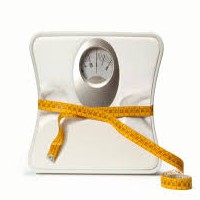Lose Weight > Weight Loss Tips > Weight Loss Articles > The Connection Between Metabolism and Weight Gain
The Connection Between Metabolism and Weight Gain
It's chemical transformations that happen from the moment when nutrients enter the body and up till the moment when the end products of these transformations are excreted from the body. Metabolism involves all reactions that result in the building of structural cellular and tissue elements, as well as processes during which the cellular substances are converted into energy.
Your weight (including your fat depot) is actually the balance between your energy intake and expenditure. You consume energy when eat or drink products that contain calories (which are units of energy). Energy expenditure is the amount of calories your body spends on its vital functions and activity.
All energy you spend is divided into:
* Basal metabolic rate (BMR) - the calories that your body uses to maintain its vital functions (growing cells, adjusting hormone levels, etc). BMR depends on your sex, age, body composition and size. It is fairly steady and doesn't change in general. It accounts for about 60% of all calories you burn every day.
* Energy spent on food processing - it includes digestion, absorption, transportation and storage of the food you eat. This energy accounts for about 10% of all calories burnt during the day and it's not easily changed.
* Energy spent on your motor activity (exercising, walking, etc.) accounts for the rest 30% of the calories the body burns during the day. It's the most vulnerable part in terms of changing.
It's a great temptation to blame metabolism for weight gain, but since metabolism is a natural process, your body knows how to regulate it to meet your needs. Excessive weight gain can rarely be caused by certain health issues that change metabolism - hyperthyroidism or Cushing's syndrome.
However, generally, if energy intake and expenditure are well-balanced, then body weight stays unchanged. If we consume more energy than our body burns during the day, this "unspent" energy is stored as fat deposits. If we spend more energy than we consume, then our body burns these fat deposits transforming them back into energy - we start losing fat; hence, we lose weight. So, to lose weight, one should create a deficit of energy by increasing the amount of calories burnt during physical activity or consuming fewer calories or both. In fact, those people said to have fast metabolism are perhaps just more active than others are.
Related Articles
-
5 Simple Tricks to Stick to Your Weight Loss Goal
Havi
-
Exercises To Burn Stomach Fat
The best way to truly lose your stomach fat is to do exercises tha
-
Turbulence Training - How To Burn Fat Review
How To Burn Fat Review Are you tired of running on your treadmill for
-
Natural Supplements and Herbal Products for Weight Loss
Thousands of people are losing weight the natural way by harnessing th
-
Apples As A Natural Diet Suppressant
There are so many products, services, advertisements, guarantees,
-
How Bariatric Weight Loss Can Help You
Bariatric weight loss is typically for those who are obese, but it
- DON'T MISS
- Weight Training Program
- Get A Lovely Figure with Effective Personal Trainer Program Available Online!
- Is an HCG diet as safe as It Is Effective?
- Benefits of Weight Lifting Gloves For Men
- Weight Loss Diet - What To And What Not To Eat
- The Abdominal Training Secrets Interview
- Fat Burning Furnace Book Download Free
- How To Get Flat Abs
- Free Tips To Help You Lose 10 Pounds
- Truths about Cellulite Reduction Cream




